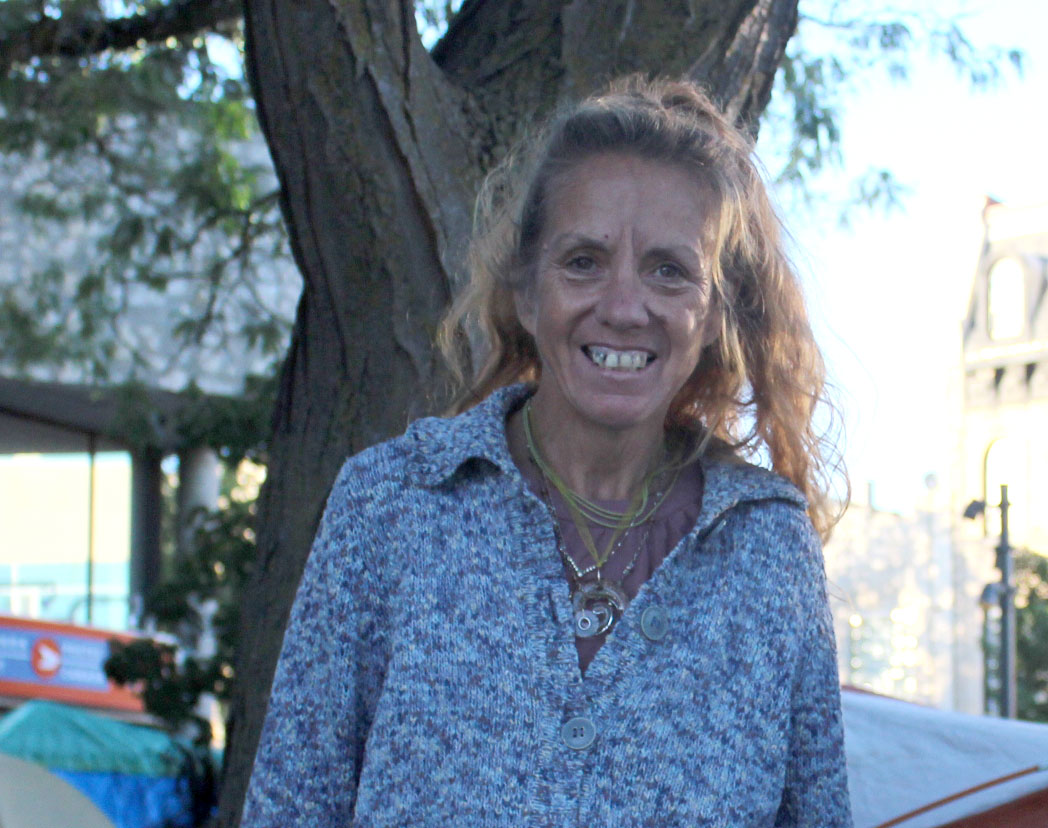GUELPH – Following over 40 delegations and a seven-hour special meeting, Guelph city council approved a controversial public space use bylaw on Aug. 28.
The bylaw, which is set to go into effect on Oct. 1 after final adoption on Sept. 10, regulates where and when “temporary structures” are permitted on city property.
Encampments will no longer be allowed in St. George’s Square downtown, where there are currently about a dozen tents sheltering homeless people.
The bylaw will also prohibit tents near rivers, ponds and railway tracks, in municipal cemeteries, on trails or sidewalks, in off-leash dog areas, community gardens, wetlands, and any other outdoor open space that the city classifies a “sensitive public space” or “designated area.”
In certain areas, including “outdoor waiting areas and building perimeters,” temporary structures will be permitted between one hour before sunset until one hour after sunrise.
In reservable spaces such as baseball diamonds and pavilions, temporary structures will be permitted when the space is not booked.
Other public areas will be “fully permissible locations” where temporary structures will be permitted at all times, such as “the open space of a park or vacant city land,” said Guelph deputy CAO Colleen Clack-Bush.
In these locations, encampments will be limited to five tents or other temporary structures.
The city is set to release an interactive map before the bylaw goes into effect that shows where encampments are permitted, prohibited and time-restricted.
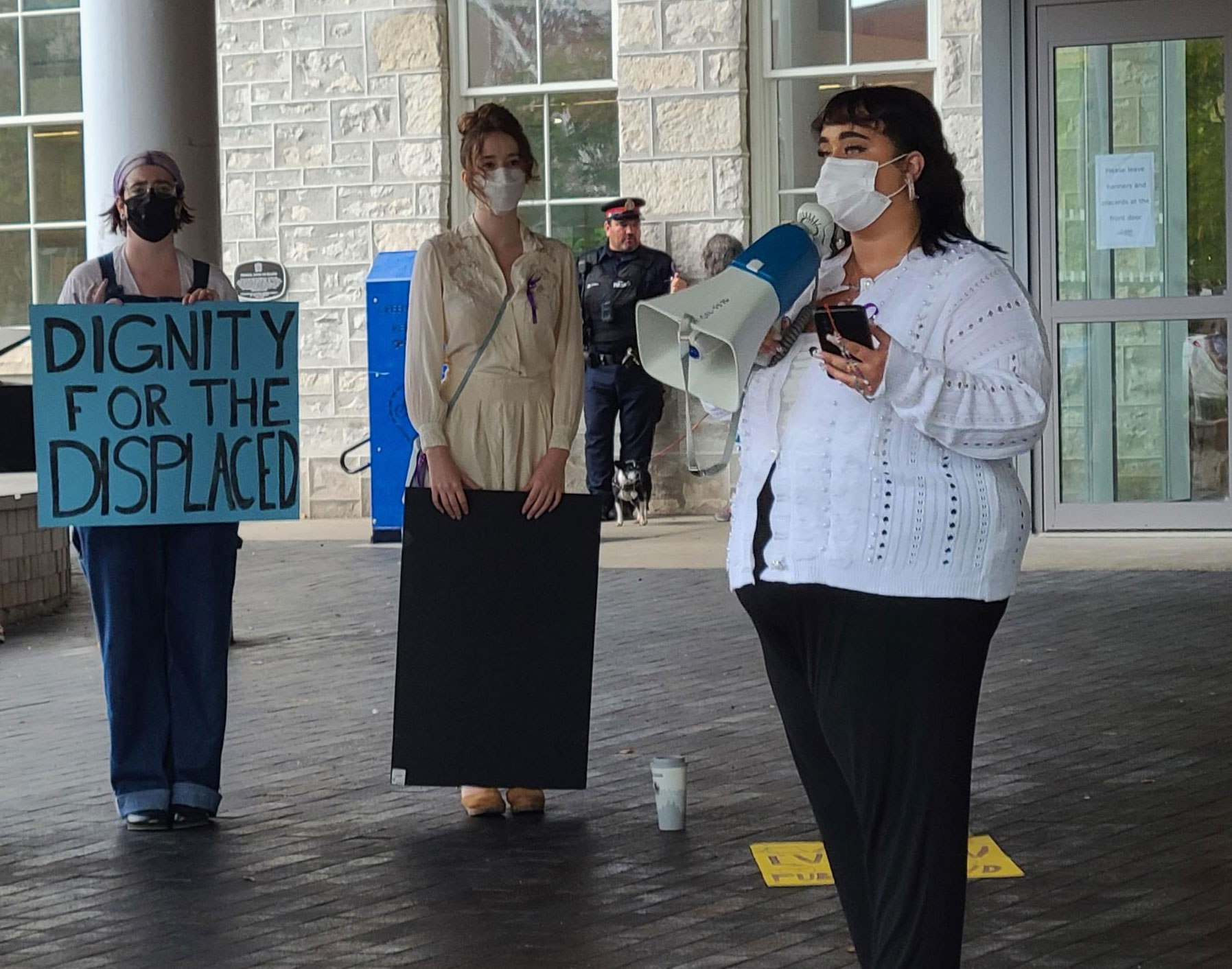
Your Downtown Guelph Friends volunteer and community advocate Kate Nixon spoke at a protest before the Guelph council meeting to discuss the public space use bylaw.
The bylaw does not include any set fines, but states anyone who fails to comply with it “is guilty of an offence and is liable to such penalties under the Provincial Offences Act … and the Municipal Act.”
It also states that anyone required to vacate a public space must remove any structure, or else the city may dismantle and remove the structure “and any cost or expense incurred is thereby a debt due to the city.”
Clack-Bush said the bylaw is not intended to ban encampments, but “accommodate the needs of unsheltered individuals so that they can live safer with dignity and with stability.”
Homeless peoples’ responses
But people at the encampment in St. George’s Square last weekend told the Advertiser they felt differently.
“Why do they want to segregate us out to the outskirts?” wondered Kim Hadden, a former personal support worker who has been homeless since shortly after her husband died last summer.
She said the square is a better place to pitch a tent than an open park because it’s closer to resources such as health care services and dinners at Royal City Mission, and it feels safer than “out in some field.
“I don’t know how we’re not safe here,” Hadden said.
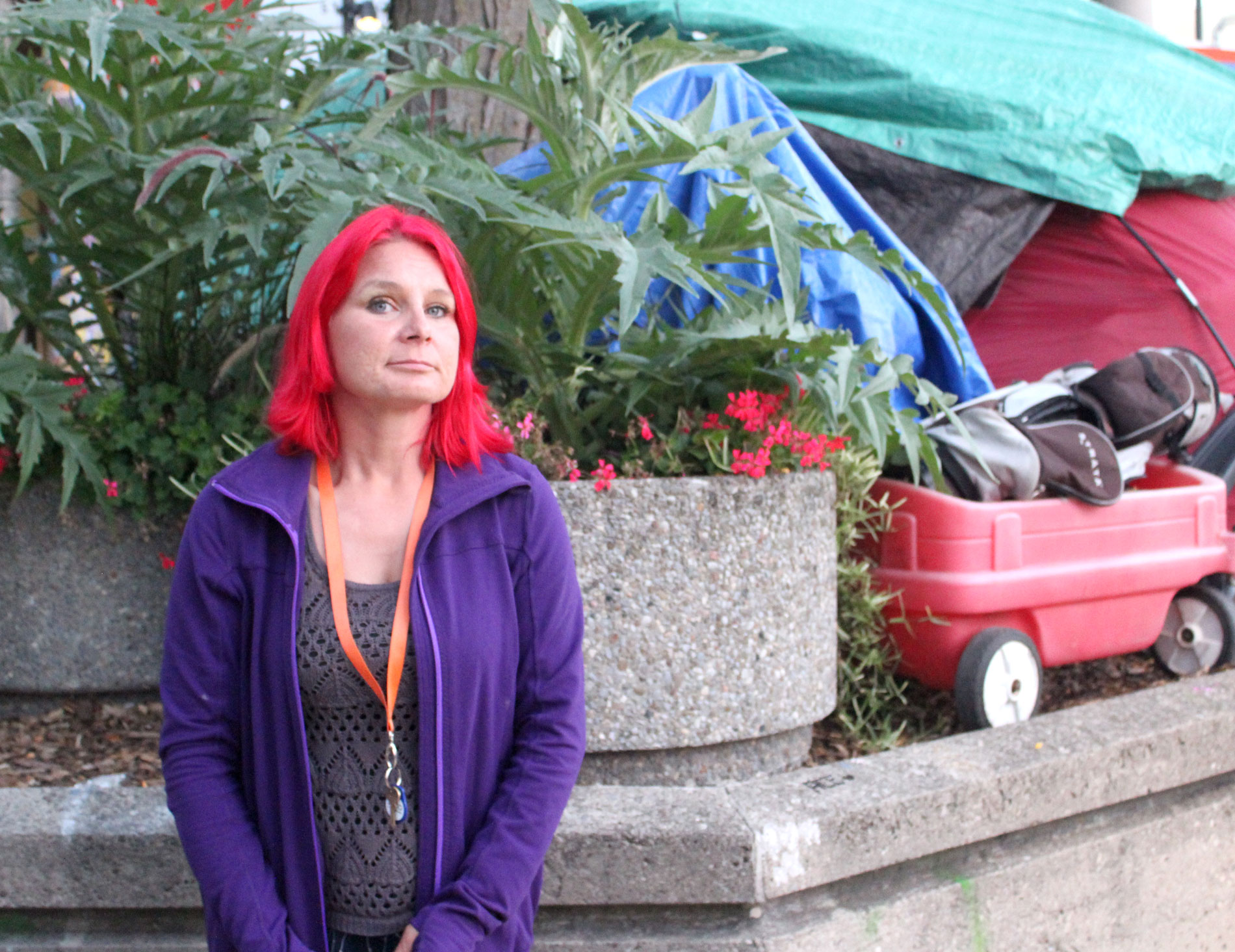
Jackie went to college and then worked with community living for 10 years before becoming homeless following a “downward spiral” after a divorce.
Jackie, who asked to be referred to by first name only, lived in the encampment before securing supportive housing on Shelldale Crescent in July.
She agreed with Hadden on the safety of St. George’s Square, noting she has also camped out in the woods behind Walmart, where she said people often stole things from her site in the middle of the night. She said she felt much more safe downtown.
“It’s better to know you have people here, watching over you,” said Jackie. “If some guy here tries to ask me to have sex with him, guys here would back me up and say ‘get away from her.’”
And people are more generous downtown, bringing leftover food like pizza “which I really appreciate because I love food – it’s the best thing in the world,” she said with a chuckle. But the bylaw makes Jackie feel like the city is “trying to sweep us under the carpet – out of sight, out of mind,” she said.
Hadden said the bylaw will make things worse by increasing isolation and stigma for homeless people.
“Homeless people are people too – they deserve some dignity,” she said.
“We are all humans – we are all equal” and valuable to the world, added Jason Nahrgang, who lives in a tent by the Speed River.
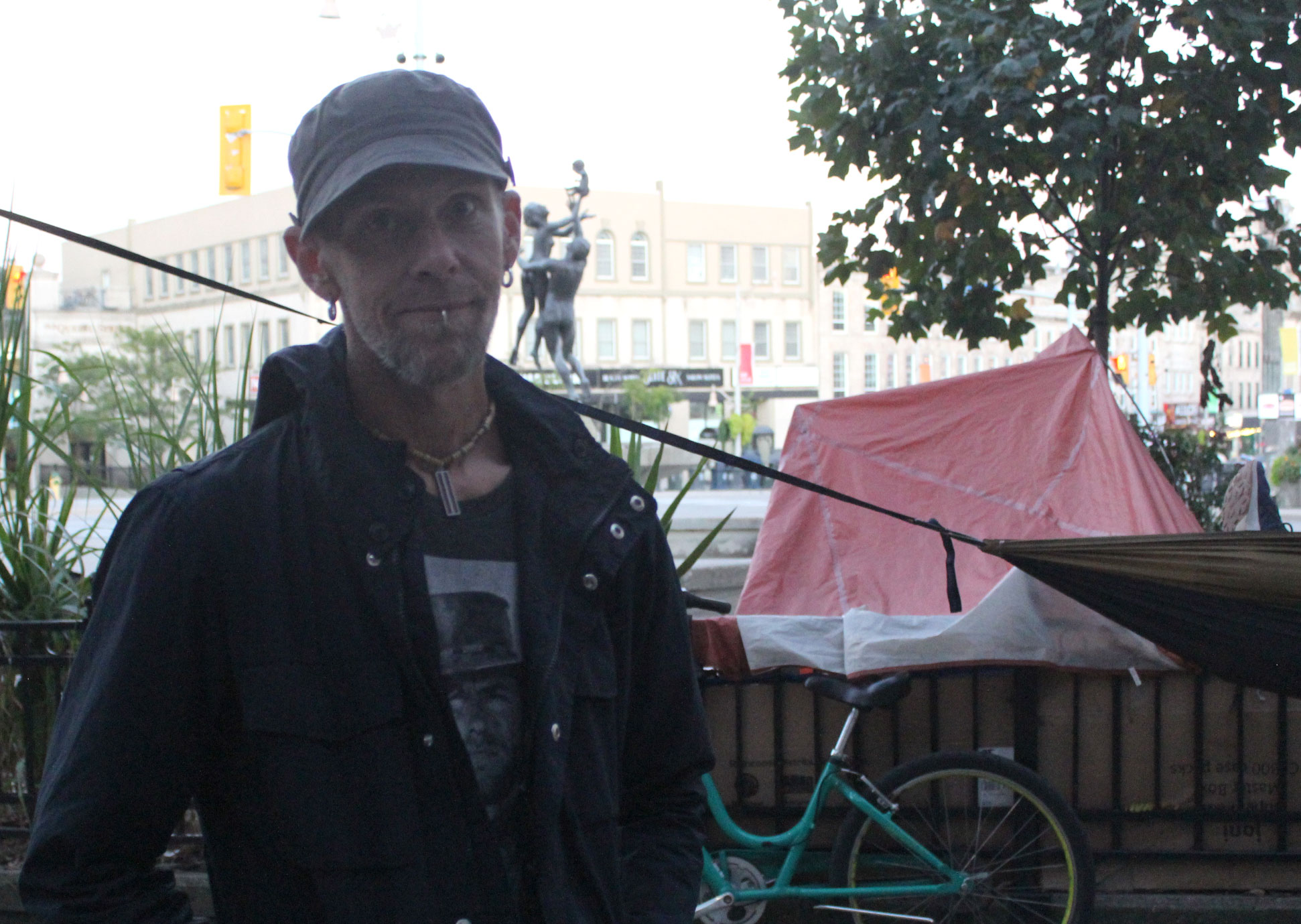
Homeless – Jason Nahrgang lives in an encampment by the river.
Nahrgang said he sees a lot of strength, resilience and generosity from those in the homeless community, and they give him inspiration, purpose and hope.
He said a team should be put together to support homeless people displaced by the bylaw.
Delegations
Of the downtown residents and business owners who delegated in favour of the bylaw, many described feeling unsafe near encampments because of violence, shouting, swearing, open drug use, and alleged sex-trafficking and sex-work in tents.
Many delegates also said the encampments deterred customers and led to decreased revenues.
But Hadden said “there’s an odd person who’s not respectful, but most of us just want somewhere to go.”
Skyline Group of Companies co-founder and CSO Jason Ashdown said his business has invested millions in homelessness, mental health and food security, including the Fergus Skyline Community Hub that’s home to the Grove, Compass Community Health, and Big Brothers Big Sisters of Centre Wellington.
Skyline is also a major contributor to the supportive housing on Shelldale.
Ashdown supports the bylaw because he said his offices downtown have “a front row seat” to the encampment in the square, where he said people wash laundry in the fountain, “congregate in hordes, engage in open drug use, heckling, crowding and general intimidation of people passing by.
“I ask that you put time and resources into solutions, but start with this bylaw,” he said to council.
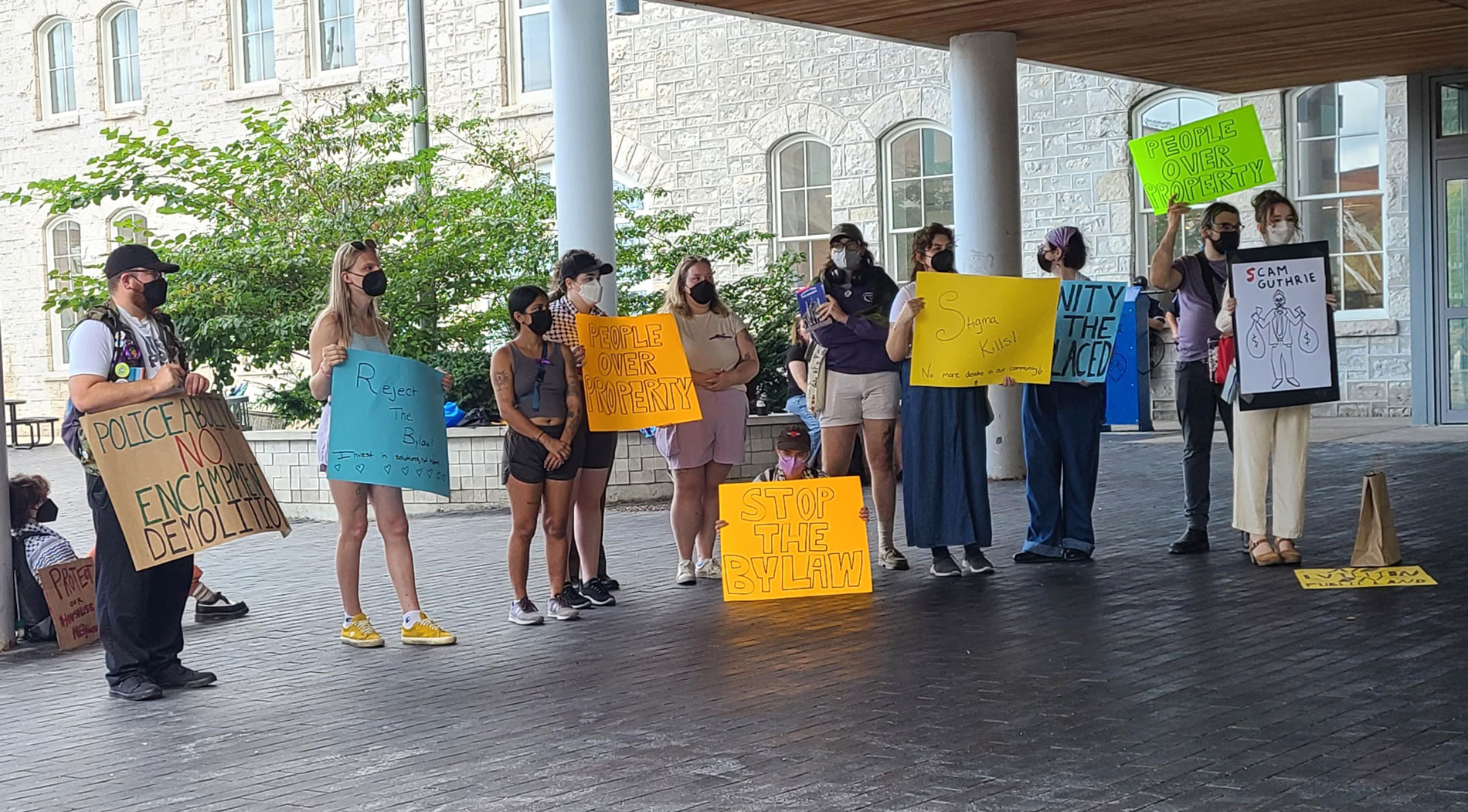
People protested in front of Guelph city hall before public space use bylaw meeting on Aug. 28.
Of the 42 people who delegated, more than half expressed absolute opposition to the bylaw, including many representatives of organizations working with homeless communities such as Sanguen Community Health, the Guelph Community Health Centre, and Your Downtown Guelph Friends.
Representatives from these organizations expressed serious concerns about the consequences of moving people away from services on which they depend.
Legal Clinic of Guelph and Wellington County executive director and lawyer Stephanie Clendening said the clinic is opposed to the bylaw. She expressed serious legal concerns about what she called human rights violations within it.
“This bylaw will not only be challenged [in court] but it will be at a significant expense to the city and taxpayers. And ultimately, it will fail,” she said.
Clendening went over examples in Victoria, Waterloo and Kingston, where similar bylaws were overturned.
There were also 62 written delegations submitted to council for the Aug. 28 meeting, both for and against the bylaw.
History
The bylaw initially came before council on Feb. 14, at which time about 30 people delegated and council received almost 50 written submissions.
At that time council passed a motion “that’s in alignment with the County’s Health and Housing Symposium, staff commence a public consultation process on the subject of use of public spaces for shelter … with specific intention and engagement with people with lived experience in encampments and the downtown community.”
Council voted to defer until after the outcome of an appeal regarding a bylaw prohibiting encampments in a Kingston park – a bylaw the superior court ruled was unconstitutional.
After Kingston’s appeal was withdrawn, Guelph “staff felt that bringing back the bylaw would not be productive at that time, as … there was no information to help guide city council in their decision-making process,” states a memo to council from Guelph’s public services that outlines the bylaw’s history.
Consultation
“Staff also stated in the April 5 report that … it was best not to undertake a specific public consultation process until council requests further action be taken on this proposed bylaw.”
Over the following week, staff instead engaged in consultation through Stepping Stone staff about tiny homes, or temporary structured encampments, with about 30 people, in addition to some people staying at the shelter.
Later that month Wellington County hosted its second Health and Housing symposium, at which people with lived experience of encampments were present.
The symposium led to the creation of a health and housing community planning table, an Indigenous advisory group, and an advisory group of people with lived experience.
But staff found engagement about the bylaw would “require careful consideration to ensure alignment with the core values of the city’s community engagement policy,” and determined that “conditions do not currently exist to do meaningful engagement on the public space bylaw.”
So public consultation did not occur.
There was also no consultation with the city’s accessibility advisory committee, although city staff ensured the committee in February that consultation would occur.
Chair Lorelei Root said the committee does not support the bylaw and expressed concerns about its “insurmountable barriers to accessibility in a community that experiences disability at a disproportionately high rate.”
Root said the bylaw has many disability-related human rights violations in it.
City staff are set to meet with the committee in October, after the bylaw is already in effect.
Increased support
Two motions were also passed during the Aug. 28 meeting regarding increased amenities for people living in encampments.
One motion was based on a delegation from Wellington County social services administrator Luisa Artuso and Emmi Perkins from the Guelph Wellington Ontario Health Team, requesting $450,000 in funding from the city to the county’s Wellington-Guelph Health and Housing Community Planning Table (WGHHCP).
Artuso and Perkins said the funding would “fill emergency and short-term gaps and develop a long-term detailed strategic action plan for people experiencing homelessness in Guelph.”
The city approved up to $450,000 to for work to be completed between now and Dec. 2025 (to be reduced if offsetting federal or provincial funds are identified).
Artuso and Perkins requested the funding go towards coordinated outreach response development and training ($75,000), daytime services including showers, storage, laundry, washrooms and food security ($275,000), an implementation plan for a daytime basic needs hub and Homelessness and Addiction Recovery Treatment (HART) Hub ($75,000), and $25,000 for “tangible items not covered by other funding sources.”
The other motion, tabled by Caton, directs staff to work with the WGHHCP to provide and maintain portable washrooms, waste bins, and sharps disposal to encampments.
Both motions passed unanimously, but councilors Erin Caton, Phil Allt, and Linda Busuttil voted against passing the bylaw.



